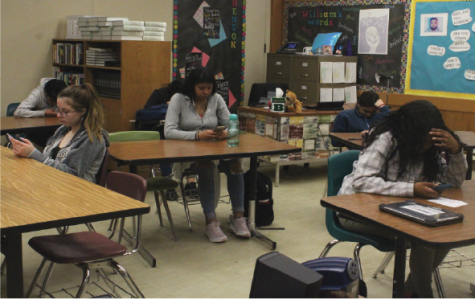Phones take over, generation finds itself addicted, anxiety filled
April 19, 2019
It’s not an uncommon occurrence for a student to check their phone seven times in 10 minutes, have their teacher notice and get it taken away from them. It’s in the moments after that, the moments away from their phone that they feel their heart start to race, their palms getting sweaty and they fill with anxiety. They have nomophobia, the fear of being away from their phone.
Nomophobia has increased in adolescents as more of their time is spent on a phones, which can ultimately lead to addiction.
According to the American Psychiatric Association, “addiction is a complex, brain disease that is manifested by compulsive substance use despite harmful consequence.” Many individuals don’t realize they are addicted since they are already acclimated to their negative habits.
It is known that increased screen time can lead to sleep deprivation, increased stress, anxiety and depression.
“I do not believe there are any positive effects from being on a phone at all times,” Kresten Borer, licensed mental health practitioner, certified master social worker and licensed alcohol and drug counselor said. “The biggest negative effect is that people are not forming person-to-person relationships and true connections with others. Online connections do not feel as real and personal as person-to-person connections.”
While many people focus on the negative impacts of screen time, others argue the benefits of phone usage. According to a research study at Harvard University, the use of cell phones simulates brain activity.
After the research study, Dr. Nora Volkow stated in a podcast with the National Institute of Drug Abuse, “the increase in brain glucose metabolism by themselves are not harmful at all. In fact they are physiological and normal events because that’s the way cells perform, get energy to perform their functions,” proving her point that the brain simulation caused from phone usage activates the brain.
Taking a look locally, ten Bryan High students with iPhones from each grade level revealed that freshmen averaged 36 hours and 16 minutes on their phones weekly. Sophomores averaged 37 hours.
As juniors prepared for and took the ACT, they averaged the lowest screen time, averaging 35 hours and 12 minutes weekly.
Seniors averaged the highest screen time with 43 hours weekly.

Defeating the purpose of Academic Expansion, a sort of study hall, students spend the time on their phones instead of working on homework. Out of the 22 students present in the class on April 10, 20 students were on their phones.
Some students credited their lack of phone usage to heavy course loads.
“AP classes have changed how much time I use my phone because with all the assignments due on certain days make me focus more on the class,” sophomore Stephany Olguin said. “I do use my phone more frequently when I’m out of school because I tend to get distracted with it.”
Others are aware of their high usage, but are not sure why they can not cut down on screen time.
“I believe I use it [my phone] more than I’m supposed to,” senior Alisha Chhetri said. “Sometimes it is so hard to get your hands off it. Sometimes I really think to myself, like wow, why am I so stuck on this device? But our social life depends on it.”
According to bankmycell.com, one reason that teens are so addicted to their phones is that parents are giving electronics to children at a young age.
“I believe more students are becoming addicted to devices because parents are buying devices for children at younger ages,” Borer said. “Many children have a phone in grade school and may have more than one device. Some families also do not have limits on screen time. Another factor is that many students use their phone or tablets as the sole way that they entertain themselves during their free time.”
Anxiety has been a common factor to people who use their phones excessively.
“This often happens when people experience social anxiety.” Borer said. “Having a phone to distract them may help in the moment, but it does not truly allow them to work through their social anxiety and form connections with others.”
Without one’s phone, a person’s health can improve mentally and physically.
“Schedule other ways to entertain yourselves during free time, like exercising or developing a hobby,” Borer said.






